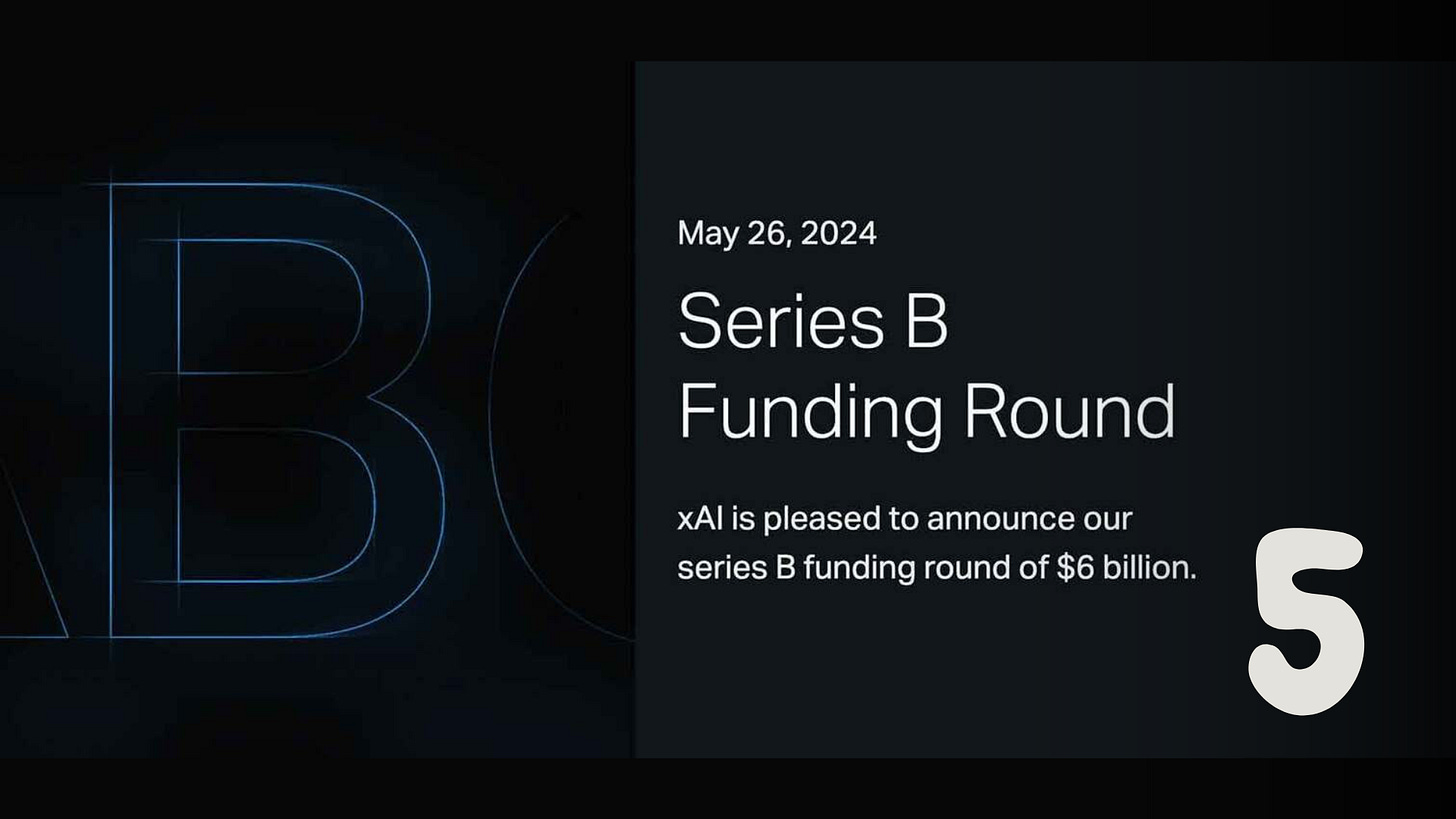🎉 AI Portfolio Analysis, Google Eats Rocks, Canva Magic, Musk Raises $6B for GPUs
Financial Analysis for All, Google Stumbles at I/O, Canva Winning, Musk's New Warchest and Hunt for GPUs
Welcome to this week’s edition of AImpulse, a five point summary of the most significant advancements in the world of Artificial Intelligence.
Here’s the pulse on this week’s top stories:
What’s Happening: A new study from the University of Chicago found that LLMs like GPT-4 can successfully perform financial statement analysis and even outperform human analysts in predicting the direction of future earnings.
The details:
Researchers provided GPT-4 with standard, anonymized statements and a prompt to mimic how analysts process financial information.
GPT-4’s insights outperformed professional analysts in predicting future earning trends, despite not having access to qualitative info.
The model’s performance also matched and even slightly exceeded other state-of-the-art models trained specifically for earning prediction tasks.
The study also found that the model’s ability came from its analysis of trends, ratios, and economic reasoning — not from training data.
Why it matters: This study not only shows that AI is about to drastically alter the financial industry, but also challenges assumptions about the tech's limits in judgment-based tasks. Soon, everyone may have access to an AI financial expert, democratizing information and analysis and changing how non-experts operate in the markets.
What’s Happening: Google’s newly unveiled ‘AI Overviews’ search feature is under fire following an outpouring of bizarre and inaccurate responses that have gone viral across social media.
The details:
The AI-generated summaries began rolling out at last week’s Google I/O event, added above standard Google search results for more streamlined answers.
The overviews have provided false and misleading information, such as recommending glue as a pizza topping, suggesting eating rocks, and more.
Google stated that the majority of AI Overview queries result in "high-quality information" and that the shared examples are uncommon.
The company is reportedly working to manually disable AI Overviews for specific searches as the issues circulate on social media.
Why it matters: In an issue reminiscent of the viral AI image fiasco earlier this year, Google’s AI tools are again in the headlines for all the wrong reasons. This rocky rollout could potentially erode trust towards the search giant’s results, and puts the company on the defensive again in spite of its impressive other AI rollouts at I/O.
What’s Happening: Canva just introduced a slew of new AI features to its creative platform, including text-to-graphic capabilities, an AI-powered photo editor, video editing upgrades, and more.
The details:
A new ‘Magic Media’ text-to-graphic tool allows users to create images, icons, and illustrations from simple text prompts.
'Magic Switch’ transforms and generates alternative media forms in seconds, such as a presentation into a website.
A new ‘Magic Write’ copywriting assistant crafts text unique to the user’s voice from a short writing sample.
New AI video-editing tools include streamlined clipping with ‘Highlights’ and ‘Enhance Voice’ to improve audio.
Why it matters: Canva’s original disruption of the design industry came by making it simple for anyone to create — and the pairing with AI is a match made in heaven. Integrating subtle but powerful AI tools will only further the ability for users to take creative workflows into their own hands.
What’s Happening: Elon Musk’s xAI is reportedly planning to build a massive supercomputer containing 100,000 GPUs dubbed a ‘gigafactory of compute’, aiming to accelerate the development of its Grok AI chatbot.
The details:
The supercomputer would use 100,000 Nvidia H100 GPUs, making it at least 4x larger than the biggest AI clusters currently in existence.
Musk hopes to have the supercomputer operational by Fall 2025, with Oracle floated as a potential partner in the endeavor.
The gigafactory will be used to further train and operate new versions of Grok — with Grok 2.0 currently being trained on 20,000 GPUs.
OpenAI and Microsoft have also discussed a ‘Stargate’ cluster even larger than Musk’s proposal.
Why it matters: The push for AI acceleration is about to lead to a scale of supercomputers unlike anything the world has ever seen. Greater compute power is the key to unlocking more capable AI — and the amount of chips, energy, and money pouring into these clusters is only going in one direction… Up.
What’s Happening: Elon Musk’s xAI just officially announced the company’s Series B funding round, raising a whopping $6B from major investors to challenge OpenAI and other competitors in the AI race.
The details:
The record-setting Series B funding round values the company at $24B post-money, just a year after its launch in July of 2023.
xAI said the funds will be used to ‘bring the company’s first products to market, build out advanced infrastructure, and accelerate R&D’.
The company is also hiring across its engineering and research division, with a reported pay higher than other competitors.
The startup is also reportedly planning to build its own AI supercomputer by fall 2025, which would require 100,000 of Nvidia's H100 chips.
Why it matters: Elon Musk predicted that AGI is coming next year — and now armed with a huge war chest, xAI can secure the compute necessary to continue scaling. The biggest winner of the announcement is Nvidia, who’ll be more than happy to provide the shovels for Elon’s AI gold rush.






